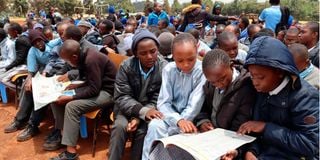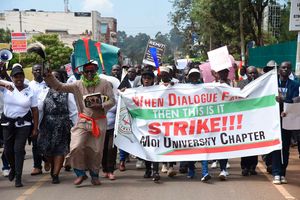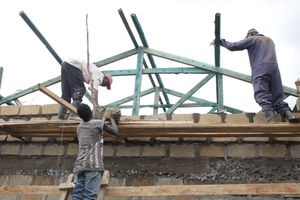
Learners at PCEA Kanjeru Primary School look at a model CBC KPSEA exam paper published in the Juniorspot pullout.
When learners return to school on Monday, January 6, the school term will differ from previous years for parents, schools, and businesses operating within the education sector.
For the first time since 1985, there will be no Form One admissions in January 2025 following the phasing out of the 8-4-4 structure in primary schools, as the transition to the competency-based curriculum (CBC) enters a new phase.
There were no Form One admissions in 1985 after primary school years were increased from seven to eight when the 8-4-4 system began. The last Standard 8 class completed primary school in 2023, and in 2024, there were no Kenya Certificate of Primary Education (KCPE) examinations, which had become a part of Kenya’s culture.
The pioneer CBC class will join Grade 9, the final stage of junior secondary school, which is domiciled in primary schools.
As a result, secondary schools are set to lose billions of shillings previously received in capitation funds under the Free Day Secondary Education (FDSE) programme, as they will have one fewer class. Each learner is allocated Sh22,244 per year in tuition fees.
Additionally, some schools will have empty and unused spaces — a welcome development following years of complaints about overcrowding since the introduction of the 100 per cent transition policy in 2014.
However, primary school headteachers will now manage billions of shillings for both primary and junior school learners. Learners in primary school receive funding of Sh14,420 per year, while those in junior school have a budget of Sh15,042 annually.
Spot checks by Nation revealed reduced back-to-school activities, unlike previous years when parents flocked to shops to buy school uniforms, books, and other items for Form One admissions. Artisans who make and sell metal boxes for learners joining Form One are also facing tough times ahead.
“Things will really change, especially in terms of business. As an artisan dealing in school metal trunks (boxes), I have been forced to diversify due to the lack of business. I decided to plan ahead, knowing there will be no Form One students, so I am producing cooking stoves instead,” said Richard Omollo, a Kisumu trader.
Bookstores and publishers will also miss out on the millions of shillings they typically earn at the start of the year selling compulsory reference and learning materials, such as English and Kiswahili dictionaries, atlases, and calculators. Those who failed to sell all their Form One textbooks now face the challenge of dead stock.
The Kenya Secondary Schools Heads Association (Kessha) has urged the government to address the financial shortfall in secondary schools by disbursing Sh64 billion in unremitted capitation funds accrued over time.
“Resources in secondary schools will be limited because we do not have Form One students. However, expenses will largely remain the same, as you cannot sack workers. Utilities such as water and electricity will also remain constant. Apart from foodstuffs, we will still incur the same expenditure,” said Willy Kuria, the Kessha national chairperson.
He said secondary school managers anticipate a shortage of resources in 2025 that could disrupt learning. With less than a week to reopening, the Ministry of Education has not disbursed capitation funds to schools.
“It is already a bad situation because, as we speak, schools are yet to receive capitation funds expected to be disbursed before the end of the year. We had a deficit of about Sh7,000 per learner in 2024. Schools are already in debt, and the situation has been aggravated,” said Mr Kuria.
He added: “There is little we can do apart from going back to parents. We do not have any alternative. The State should release the Sh64 billion that has been withheld over the last five years so that we can clear existing debt. We have already appealed through the National Assembly.”
He said schools have debts of up to Sh70 million in some cases, and that the school he heads has a debt of about Sh30 million. Mr Kuria fears that once schools reopen, suppliers will demand payment of outstanding bills.
“Classrooms that were occupied by Form Fours will be empty. Those built for CBC, when junior school was initially supposed to be in secondary schools, will also be empty. So, there will be a lot of unused space, and that is why we wanted to accommodate Grade 9 to avoid duplicating the construction of classrooms. Unfortunately, no one heeded our proposal,” he said.
He added that schools were engaging parents to help cover additional costs arising from the reduced number of students.
“Most schools are asking parents to help bridge the gap. As Kessha chairman, I urge parents to cooperate and understand the situation,” he said.
In a reversal of roles, primary schools now face infrastructure shortages and congestion due to increased enrolment.
Initially, secondary school principals, through Kessha and the Kenya Union of Post-Primary Education Teachers (Kuppet), had petitioned the State to split junior school between primary and secondary schools, citing the availability of infrastructure, including classrooms, laboratories, and teachers, in secondary schools.
The roll-out of junior school in 2023 has been far from smooth and, in many cases, chaotic. It has been plagued by shortages of teachers, learning materials, and critical infrastructure.
“Why can’t the learners transition to secondary schools, which have adequate facilities such as classrooms and laboratories? Moreover, this year, there will be no Form One class, and the classrooms will be empty, yet they can accommodate Grade 9,” said Kuppet Assistant Secretary General Moses Nthurima.
Recently, the Head of Public Service, Felix Koskei, warned primary school headteachers against engaging in corruption, given their increased budgets. He urged school managers to ensure prudent and effective management of resources.
“I know it is tempting when you find out you will be handling Sh10 million. You aspire to buy a car or a plot in the trading centre. But please manage these public funds prudently. Be vigilant and alert,” said Mr Koskei.
On his part, the chair of the Kenya Primary School Heads Association (Kepsha), Johnson Nzioka, urged the State to ensure timely release of funds before school terms begin to facilitate smooth operations.
His vice chair, Fuad Ali, expressed confidence that the transition to Grade 9 would be smooth, unlike the challenges experienced in Grades 7 and 8.
“Everything is set. Classrooms are almost complete, most books have been supplied, and teachers have already been posted. I have received seven teachers at Tom Mboya Primary School in Mombasa, where I serve as headteacher,” said Mr Ali.
The National Parents Association chairperson Silas Obuhatsa urged private schools to work on infrastructural development for junior school.










